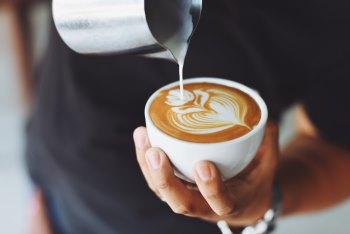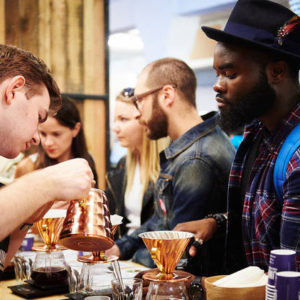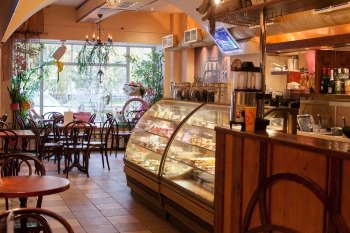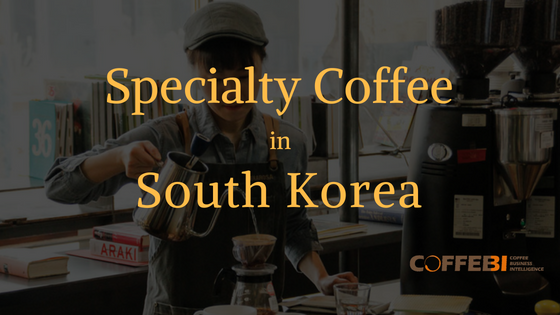In Northern capital of Russia there is now a new format of bike renting and coffee sharing. To promote charity and bikes there has been created a possibility to get a free hour of bicycle rental. All a person should do is suspend a coffee in a coffee shop that has joined this program, and then have a free hour of bike riding.
Month: April 2016
UK: The Boom In Specialty Coffee

Artisan Coffee Roasters are prospering in the UK. The last five to six years have demonstrated rapid growth of roasteries with about 300 roasteries operating by 2015. The fact is nourished by the fact that the UK coffee lovers are tired of low cost dull drinks and have a desire of more refreshing flavors. The growth of coffee roasters is approximated at 20% per year although the artisan coffee makes up less than 1% of total coffee market growth, as the biggest portion about 65% is contributed by instant coffee. [Sign in to continue]
Starbucks launches a controversial loyalty program in Russia
MOSCOW – Starbucks in Russia has updated its loyalty program following the similar changes in the US market. The new program My Starbucks Rewards started on April 18, though Russian version has some differences. A start is still awarded for a purchase, regardless the summ on the check. According to the new award system in the United States, the customers now get two stars
The 9 most asked questions at The London Coffee Festival 2016

We recently spent four days at the London Coffee Festival held at The Old Truman Brewery, Brick Lane. The event was the best yet with 30,488 visitors, both trade and the public, who came along to savor the sights, sounds, smells and buzz of what felt like a real festival. By spending time talking to hundreds of budding and experienced
Europe and the espresso machine market 2016

According to a recent survey by CoffeeBI, customers’ main criteria when making an espresso machine purchasing decision was “price”, the “ability to provide technical assistance” and the “front staff professionalism”. These three items received a higher score among the 10 that were put to the vote among manufacturers. Other main criteria listed were the “punctuality in delivering”, as well as
A New Coffee Shop Format In Moscow

The lawmakers in Moscow have recently changed the rules for open-air cafes. The coffee shops now have an opportunity to implemet new formats for their pavement constructions using benches, platforms, and even window sills. It is a very important innovation because rules for summer cafes and terraces are very strict, and the permission to construct such terrace depends on the width of the pavement.
Discovering Coffee Roasters In Korea
Coffee Libre is a self-reliant roaster. It started from selling 100 pounds of coffee beans each month and eventually spread its connections to over six countries and 14 different farms. It is owned by the first Korean Q-grader Philhoon Suh.
At a distance of three hours drive from Seoul and other big cities of Korea, is located Terarosa Coffee Roaster, in Gangneung which despite being far off can be seen packed with people. They are known as the name that paved the way for direct trade of specialty coffee beans.
The growing interest in coffee is pretty obvious in Busan, the second largest city of Korea, too. A small number of specialty coffee shops have gathered form an association that goes by the acronym BUS (also the recognition code for Busan Seaport). The joint force work towards offering discounts over large purchases, promotional schemes, and own shared green bean storage.
The Increasing Consumption Of Coffee In China

Looking at per capita coffee consumption, five to six cups per person per year, in a so highly populated nation like China, seems to promise for future growth as there has been a double digit rise in coffee production and consumption in the past few years.
Extracted from the monthly export and import data of the last 20 years, ICO estimated that for past ten years, every year there has been an average of 16% coffee consumption growth. [Sign in to continue]
13 Ways Independent Coffee Shops Can Beat The Coffee Chains

How do I compete with the chains?
We get asked this a lot, particularly at a time when an existing independent coffee bar finds itself with a new big branded neighbor. We have had a lot of experience of this over the last 10 years and in fact, we compete in our own business successfully against a much larger national chain.
But what are the key elements to effectively attract customers in the face of the big brands?
Brand Comfort
The biggest advantage the chains have over you is that the customer knows what they are going to get when they walk through their doors. The chances of them recognizing the brand or even having already visited this chain in another town are high. It’s the same reason we drink coke when we are in a foreign country, it’s the safe option.
To combat this feeling of safety you should look at your business from across the road. Does it look inviting, are there visual clues for the customers so they understand what to expect? Is your signage clear and does it say what you do and stand for? For example, do you provide take away? It’s a given that the chains serve take away coffee but it’s not always so obvious in independents. Are your windows clean and your frontage litter free and are your food hygiene standards clearly visible? All these things will either encourage or deter guests from stepping over your threshold.
Consistency
Lack of consistency is a key reason you lose your customers. Your independence is a strength but the freedom that you give your team could be your downfall.
The chains expend a lot of corporate energy in ensuring that the brand standards are adhered to throughout their estate of shops. Strict rules are in place, much training is given and audits are happening every day to ensure that all drinks are made the same way and so taste the same everywhere they operate.
In some independents the lower levels of training, the cult of personality, where each barista has their own style of drink and the turnover of staff. All work together to reduce the chances of a guest getting the same drink made in the same way. This lack of consistency will drive customers away.
The successful independents work really hard to ensure that their drinks are always consistent and that their guests can feel comfortable that the flat white they order on Tuesday will be the same as the one they drank on Monday.
Service
This should be an easy win against the chains as your guests already believe the big chains are faceless so you are halfway there. What little things can you do to that will make you stand out from your competition? [Sign in to continue]
Specialty Coffee in South Korea

More and more Koreans love having their cup of coffee in the late hours in a café. Coffee shops do not close before 10 pm and start their business the next day in the noon, and in the morning the cup of coffee is mostly purchased while in the afternoon instant coffee is preferred. At the end of day, cafes are the hang-outs that are seen populated after dinner.
According to the USDA report, the specialty coffee big chains markedly increased their growth as compared to the independent shops offering specialty coffee. In a comparison between the number of independent specialty coffee shops and chains no more than 5% variation is observed since 2009 for independents [Sign in to continue]
